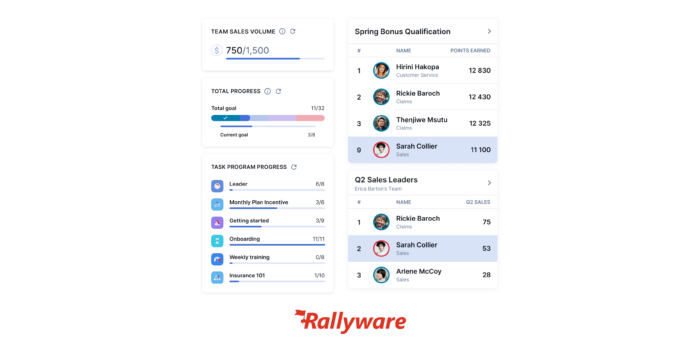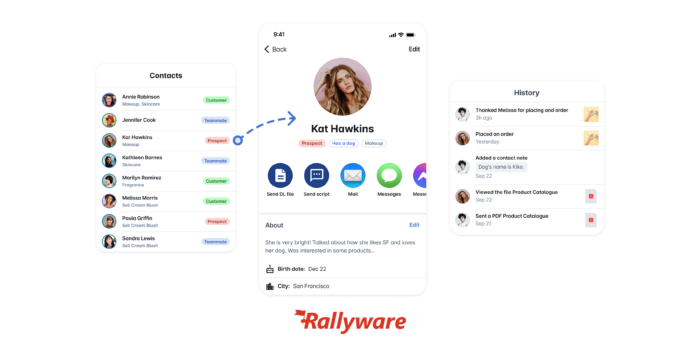Direct Selling Leaders on the Modern Distributor Experience
How to Use Workforce Mobile Apps to Drive Day-to-Day Sales
In the current retail environment where consumers are cautious and economic conditions are uncertain, leveraging mobile apps to drive sales during the daily flow of work is essential to empower frontline staff and boost retail sales through workforce engagement management. As an operations leader, how can you achieve this?
Implementing the right kind of platform-based apps, complete with elements discussed below, can enable higher performance and more efficient daily operations. Such apps can enable sellers to perform at their best, and also drive sales. This is the key to successful workforce engagement management in 2024.
How to use apps for workforce engagement management
Use visualized KPIs, badges & leaderboards to reward the right behaviors
While an app offering words of encouragement like “keep up the good work” can provide some motivation, one that grants users real-time visibility into their current progress and performance is more impactful.
Leaderboards, for instance, serve as a concrete indicator of accomplishments and guide individuals toward continued success.
Without visualization of progress, along with recognition, sellers may feel that they are simply taking and fulfilling orders, rather than working towards something.
Rewarding actions requires a strategic approach, ensuring that incentives align with each individual’s contribution to both business KPIs and overall company growth.

Use a smart CRM to encourage repeat sales & customer acquisition on the sales floor
In the retail realm, where the customer experience is paramount, sellers must nurture relationships with existing customers and develop relationships with new ones.
Equally crucial is the need for a powerful tool to build and manage these relationships.
This is where the smart CRM comes into play. Think about the traditional rolodex that is useful for managing multiple contacts, yet the smart CRM takes it a step further by intelligently suggesting what the seller should do next to further develop the relationship, even helping you confront overstock problems.
The smart CRM combines external data sources, such as the seller’s historical activities and performance metrics on the platform, and the company’s defined “if-then” business rules to propose actions that are well-informed, relevant, and productive.
For instance, a customer purchased her first road bike. For you as a seller, the smart CRM might suggest resources that you can send to her, such as suggested maintenance and repair tips. It may also prompt you to follow up in a few weeks to inquire about the new bike, emphasizing your blend of product knowledge and also showing authentic care. What’s more, all of this is embedded in the flow of work, and available right in the hands of each individual.

Use push notifications to develop and reinforce produce knowledge
Notifications, especially those lacking relevance or failing to capture attention, can be distracting and overwhelming when received multiple times per day.
Yet notifications that are personalized, targeted, and aligned with one’s goals are truly impactful.
As proof of this? We previously found that, across our global customer community in 2022, more than 212 million notifications were delivered and nearly 97 million of those went on to trigger engagement with learning and development tasks. What’s more, salespersons who interacted with notifications displayed a 7.4X higher completion rate compared to those who skipped or ignored notifications.
Use AI sales coaching to enhance customer experience & workforce capability
Today, AI tools are transforming the ways in which we work, learn and create. In the retail environment, an AI sales coach can serve as an interactive virtual tutor, helping to clarify concepts and solve problems. In the example above, it can help to craft messages for the seller to send to her customer about her new road bike. Ultimately, it can help lay the foundation for additional ideas and content creation, and save a lot of time.
The power of mobile apps for workforce engagement management
Given the widespread use of mobile devices, incorporating a daily mobile app into sales operations appears to be the logical decision—especially considering the average American checks their phone a whopping 352 times per day!
The bottom line is: utilizing platform-based apps is crucial for delivering tailored content to sellers precisely when it can optimize their performance and productivity. This content should align with their specific goals and needs, recognizing that each person is unique and follows a distinct path. While apps that assist with retail functions like inventory management are very useful, those specifically designed to drive sales in the flow of work are exceptionally powerful. Can your app do that?
Book your demo of our Performance Enablement Platform to see how a workforce engagement management software can help you drive day-to-day sales!
News and Insights on Workforce Training & Engagement
We’re among top-notch eLearning and business engagement platforms recognized for effective training and talent development, helping to empower distributed workforces
Subscribe
